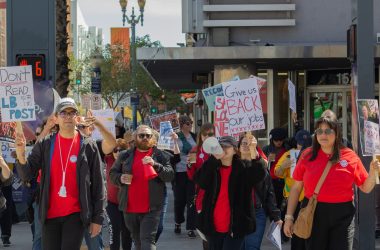Affordable Care Act repeal
The Affordable Care Act , which was put into effect in 2013 and currently cover over 20 million Americans, is now in the early stages of being repealed.
The executive order, which was signed on the first day of Trump’s presidency, would allow the Secretary of Health and Human Services and the heads of other departments to “waive, defer, grant exemptions from or delay implementation of any provision or requirement,” according to official signed document. While it is the process of being repealed, it was reported by the Washington Post that Trump promised a replacement that would include “insurance for everybody.”
U.S. Border security
An existing fence that has served as a separation point between the U.S. and Mexico for decades is now expected to get a maximum renovation.
The executive action, which was one of the first signed orders, would include:
The building of a new wall
Hiring of 5,000 new border patrol officers, an end to the catch and release system (which allows immigrants to stay in the U.S while waiting for a hearing with an immigration judge)
Allow local law enforcement to act as immigration officers
Hiring of 10,000 new immigration officers
Create and operate detention facilities near the border.
“Mexico City Policy”
The memorandum itself would ban the use of U.S. taxpayer dollars from funding organizations and programs that would support and/or participate in the “management of a program of coercive abortion or involuntary sterilization.” This order would limit the access to legal abortion clinics that woman may need.
The policy, which was coined after Mexico’s own anti-abortion policy, and first put into effect by the Reagan administration, has a history of coming in and out of office depending on the active White House party. It has now once again come into effect with Trump’s presidency.
Defunding sanctuary cities
Sanctuary states and cities, which are known to shield undocumented immigrants from deportation, would be subjected to defunding by the new administration. Press secretary Sean Spice stated that the new order would, “strip federal grant money from the sanctuary states and cities that harbor illegal immigrants.”
The order would restrict “sanctuary cities” from asking for federal grants, but would not necessarily be able to cut off all federal funding.
Reevaluating visa and refugee programs
Probably one of the more prominent orders signed by President Trump is the reevaluation of the visa and refugee program. Some of the changes to these programs would prohibit the entry of “immigrant and non-immigrants” from seven muslim majority countries. Some of the new effects would include;
Suspending of the the visa interview waiver program, (which allows certain people from renewing their visas without an in-person interview)
Cut the number of refugees allowed into the United States from 110,000 to 50,000
For 120 days, suspends the U.S. Refugee Admissions Program, which identifies and processes refugees for resettlement in the United States.
Some of the orders have already been put into immediate effect and resulted in the detention of several visa holders who were returning to the U.S from the listed territories.
Keystone and Dakota Access Pipeline
The issue of the oil pipelines, which were each respectively halted in 2015 and 2016 by the Obama administration in will now be up for negotiations once again after signing the executive order for the revival of the building project .
The Keystone XL and Dakota Access oil pipelines, which would carry Canadian oil sands crude from Canada to Texas, had as many as 800 camping protesters, according to the LA Times. The pipeline would garner the U.S. government 25 percent of the pipeline’s profits and the project would be negotiated with terms of the administration.
Expediting infrastructure projects
The action would speed up the process of the construction of infrastructures and would also expedite the review from environmental associations who on average, take long periods of time to review the building of projects and how certain buildings and structures could cause harm to the surrounding environment.
President Trump signed the action while stating that infrastructure projects in the U.S. “have been routinely and excessively delayed by agency processes and procedures”.
Strengthening the military
The memorandum states that appointed secretary of defense James Mattis must assess and review the “readiness” of the U.S military within the next 30 days. The U.S., which already holds the biggest military budget in the world at $597 billion is expected to present fiscal budget for 2018 within the next 30 days.
Five-year lobbying ban
The order permanently prohibits past officials from lobbying for any foreign government or political party. It bars, “every executive appointee in every executive agency” from “lobbying activities with respect to that agency”. It also goes on to explain that the same rule would be in effect for 5 years after the official is no longer involved with their position.
Defeat ISIS
The memorandum, which also appoints secretary of defense James Mattis, expects Mattis to come up with a plan to rid of ISIS. The plan must include a “comprehensive strategy for defeating ISIS, change to the rules of engagement, and come up with strategies to de-legitimize “radical Islamist ideology.”
According to the official White House memorandum document, the plan would also include to cut off ISIS’ financial support and identification of new partners.
Federal job freeze
The order, which is meant to freeze the hiring of federal workers in an attempt to cut government payrolls. The memorandum took effect at noon on January 22.
The freeze exempts military personnel but stops other offices from creating positions that are “otherwise unnecessary” according to Press Secretary Sean Spicer.
Spicer also stated that the freeze, “…prevents filling vacant positions and creating new positions except when necessary to meet national or public security responsibilities.”
Widen NSC audience
The National Security Council, which operates national security and foreign policy matters, would now need to open its meetings to the presidential administration staff. Some, of which would include; chief of staff Reince Priebus and White House chief strategist Steve Bannon. Political officials, who usually don’t attend will now be able to sit in and be able to attend any NSC meeting that they choose.
*Information from Politico, CNN, Washington Post, and The White House official page



